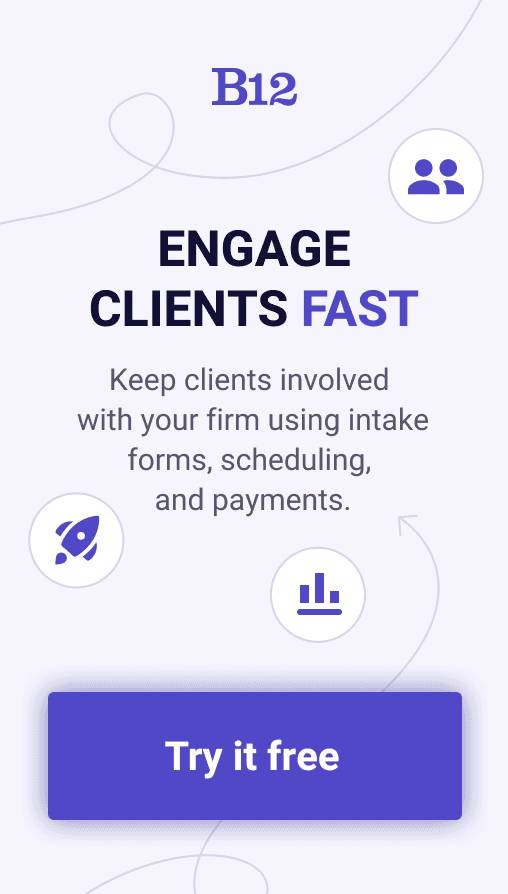Build an AI website in 60 seconds
AI generates your personalized website instantly with built-in scheduling, payments, email marketing, and more.
Start for free
What's the difference between an invoice and a bill?

Tired of getting confused between invoices and bills? Is there a difference between them or are they the same? The difference between an invoice and a bill is crucial to understanding your expenses, whether you're a business owner or an individual.
It's time to delve into the world of financial documents and figure out what these terms really mean. Now let's get started and clear up any confusion!
What is the difference between an invoice and a bill?
Both an invoice and a bill are important parts of a financial business transaction, but they serve different purposes. It's crucial to know the difference between these two terms.
Identifying an invoice from a bill is crucial for financial planning and invoice bill payment organization. It lets people and businesses manage their cash flow effectively and allocate their funds. Furthermore, knowing the difference between an invoice and a bill can save you time and confusion.
Understanding invoices
An invoice serves as a payment request. It's usually issued by a seller or service provider, such as educational service providers. Invoices break down the products and services rendered, as well as the costs.
An invoice is a formal document that requests payment from a customer for goods or services. This document helps keep track of the sales transaction and tells you when to pay, how much you owe, and what taxes or fees apply. To keep track of your finances and make sure you get paid on time, you'll need invoices.
Key elements of an invoice
Several key elements make up an invoice. These include:
- Date: The date when the invoice is issued.
- Invoice Number: A unique identifier for the invoice, which helps for tracking purposes.
- Biller Details: Information about the seller or service provider, including their name, address, and contact details.
- Itemized Charges: The quantity and cost of each item in the product or service.
- Due Date: When the payment needs to be made.
- Payment Terms: Things like discounts for early or immediate payment or late payment penalties.
How to view and manage invoices online
With the advent of technology, businesses now have the option to view and manage invoices online. Billing platforms offer convenient features to streamline the invoicing process. Users can easily access and track their invoices, view payment statuses, and manage multiple invoices in one place. Online platforms also provide secure payment options to ensure the safety of financial transactions. Overall, online invoice management offers efficiency and ease of use for businesses and individuals alike.
Understanding nills
Bills play a crucial role in our day-to-day lives as they represent the amounts owed for various goods and services.
A bill is a formal request to collect payment from a service provider or vendor to their customers. It serves as an official document outlining the charges incurred by the customer for the goods or services sold.
Unlike an invoice, which is typically sent before the payment is due, a bill is usually issued after the services have been provided or the goods have been delivered. The main purpose of a bill is to notify the customer of their outstanding balance and request payment.
Different types of bills
There are various types of bills that individuals encounter in their daily lives, such as utility bills, credit card bills, and medical bills. Utility bills encompass expenses for services like electricity, water, gas, and internet. Credit card bills, on the other hand, detail the charges made using a credit card, including the outstanding balance, minimum payment due, and purchase history. Medical bills outline the costs incurred for healthcare services, treatments, and medications.
Key components of a bill
When you receive a bill, it typically includes important information that you need to review and process. The key components of a bill include the billing period, which indicates the time frame for which the services have been provided or goods have been acquired.
Additionally, the bill will contain the details of the biller, such as their name, contact information, and any account or reference numbers associated with your account. It is also common for bills to provide different payment options, allowing customers to choose how they want to settle their outstanding balance, whether it be through checks, bank transfers, or online payment platforms.
How to pay bills online
With the advancement of technology, paying bills online has become increasingly convenient and efficient. Billing tools offer seamless bill payment options that simplify the process for consumers. When it's time to pay a bill, you can log in to your account, locate the bill you want to pay, and choose your preferred payment method. You can opt to make an electronic bank transfer or use a credit or debit card to complete the payment. Reliable billing platforms securely process the transaction and ensure that your payment is accurately applied to your biller's account, minimizing the risk of errors or delays. The availability of online bill payment services has made settling bills simpler and more convenient than ever before.
Comparing invoice vs bill
Similarities between invoices and bills
Both invoices and bills serve as financial documents that communicate a payment request from a vendor or service provider to a customer. They share some common features that make them easily confused. Both invoices and bills include important details such as the date, biller details, and a unique identification number. Additionally, they outline the products or services purchased and their corresponding costs.
Main differences between invoices and bills
It is crucial to understand the differences between invoices and bills to accurately manage your finances. The origin of these documents is one key distinction. Invoices are usually issued by the seller before any payment has been made, serving as a formal request for payment. On the other hand, bills are typically generated by a service provider or creditor after the service or product has been delivered or consumed. Bills inform the receiver of the amount owed for the goods or services provided.
Additionally, invoices and bills differ in terms of their stage in the payment process. Invoices are often used to initiate a transaction and prompt a payment. They precede the receipt of payment and provide a detailed breakdown of the charges. Bills, on the other hand, are issued after the completion of a transaction and serve as a record of the amount due. They are typically accompanied by payment options and specific due dates.
Another significant difference lies in the level of detail provided. Invoices tend to be more detailed, providing a breakdown of individual items or services, their quantity, unit price, and any applicable taxes or discounts. In contrast, bills may present a summarized total amount due without the same level of itemization.
While invoices and bills may share some similarities, it is important to recognize their differences in origin, stage in the payment process, and level of detail. This understanding allows for effective financial management and accurate tracking of expenses. By using billing tools, you can easily view and manage invoices and bills online, streamlining the payment process and ensuring efficient financial record-keeping. Taking advantage of online bill payment services can provide convenience, efficiency, and enhanced security in managing your financial obligations.
Benefits of online bill payment services
Online bill payment services offer numerous advantages for individuals and businesses alike. These platforms streamline the bill payment process, making it more convenient and efficient. Here are some key benefits of using online bill payment services:
Convenience and time-saving aspects
By using online bill payment services, individuals and businesses can save precious time and eliminate the hassle of manual bill payments. With just a few clicks, users can view and manage all their bills in one centralized platform. They can set up automatic payments and schedule payments in advance, ensuring bills are paid on time without the need for constant manual intervention.
Secure payment options and tracking features
Online bill payment services prioritize security and provide secure payment options for users. These platforms often use encryption and other security measures to protect sensitive financial information. Additionally, they offer tracking features that allow users to monitor their payment history and ensure payments are successfully processed. This added security and transparency give users peace of mind when managing their bills online.
Optimization of bill payment process
Using online bill payment services allows users to optimize their bill payment process. These platforms often offer features like bill reminders, which notify users of upcoming due dates, helping them stay organized and avoid late payment fees. They also provide tools for categorizing and tracking expenses, which can be especially beneficial for businesses. By efficiently managing and categorizing bills, users can gain better insights into their financial health and make informed decisions.
Integration and compatibility
Another advantage of online bill payment services is their integration and compatibility with other financial management tools and software. Many platforms can sync with accounting software, enabling seamless integration and automatic data transfer. This integration simplifies the overall financial management process by reducing duplicate data entry and streamlining workflows.
Online bill payment services provide a range of benefits, including convenience, time savings, secure payment options, and optimization of the bill payment process. By leveraging these platforms, individuals and businesses can effectively manage their bills, improve their financial organization, and increase their overall productivity.
Recap on understanding invoices and bills
Understanding the difference between invoices and bills is crucial for individuals and businesses alike. By accurately identifying whether you have received an invoice or a bill, you can appropriately prioritize payments and ensure you meet all financial obligations. This knowledge allows you to avoid penalties, late fees, and potential damage to your credit score. Furthermore, understanding invoices and bills can help you maintain better financial organization and make informed decisions about budgeting and cash flow management.
Exploring online bill payment services for ease and convenience
Online bill payment services offer numerous benefits that enhance your bill management experience. These platforms provide convenience and time-saving features by allowing you to view, track, and pay invoices and bills all in one place. With secure payment options, you can trust that your transactions are protected. Additionally, online bill payment services offer tracking and reporting features that help you stay on top of your financial obligations and gain valuable insights into your spending patterns.
B12: a reliable platform for managing invoices
With the right tools and knowledge, you can confidently navigate the world of invoices and bills. When it comes to managing invoices effectively, B12 stands out as a reliable and user-friendly platform. With our intuitive interface, you can easily view and organize invoices, set up automatic recurring invoices, request payments, and monitor payment statuses.
Optimize your invoice management process and gain greater control over your finances with B12. Whether you are an individual or a business owner, B12 provides the tools you need to streamline your invoice management process and stay on top of your financial responsibilities.
Use B12 to establish your small business online and get everything you need to sell services. Get started today for free in 60 seconds
Attract, win, and serve more clients
Receive helpful resources directly to your inbox to help you succeed online.
Draft your site in 60 seconds
Get an AI website made specifically for you that's free to launch.
Start for free ✨No credit card required
Spend less time on your website and more time growing your business
Let B12 set up your professional online presence with everything you need to attract, win, and serve clients.





